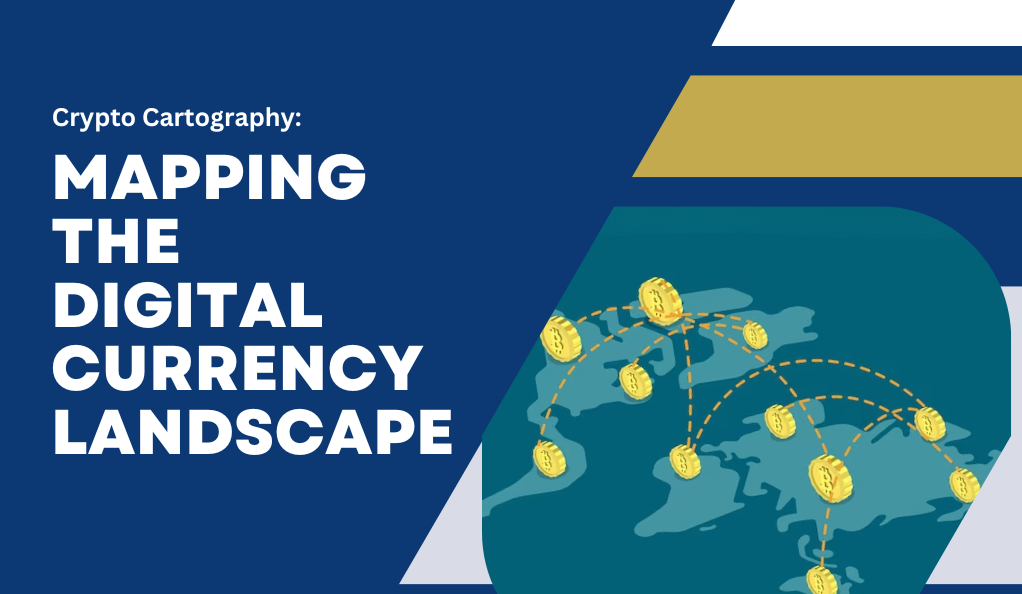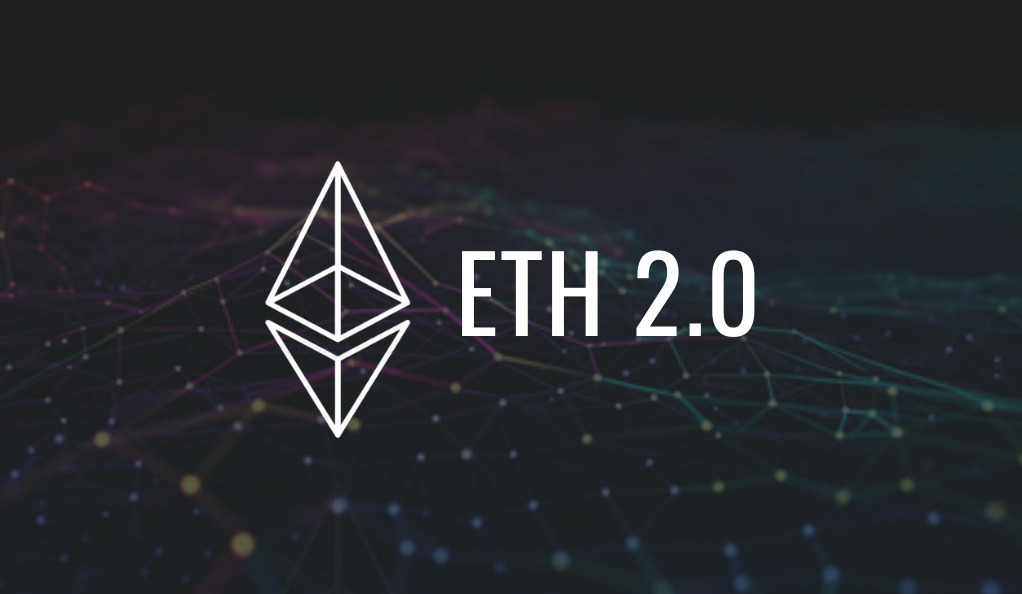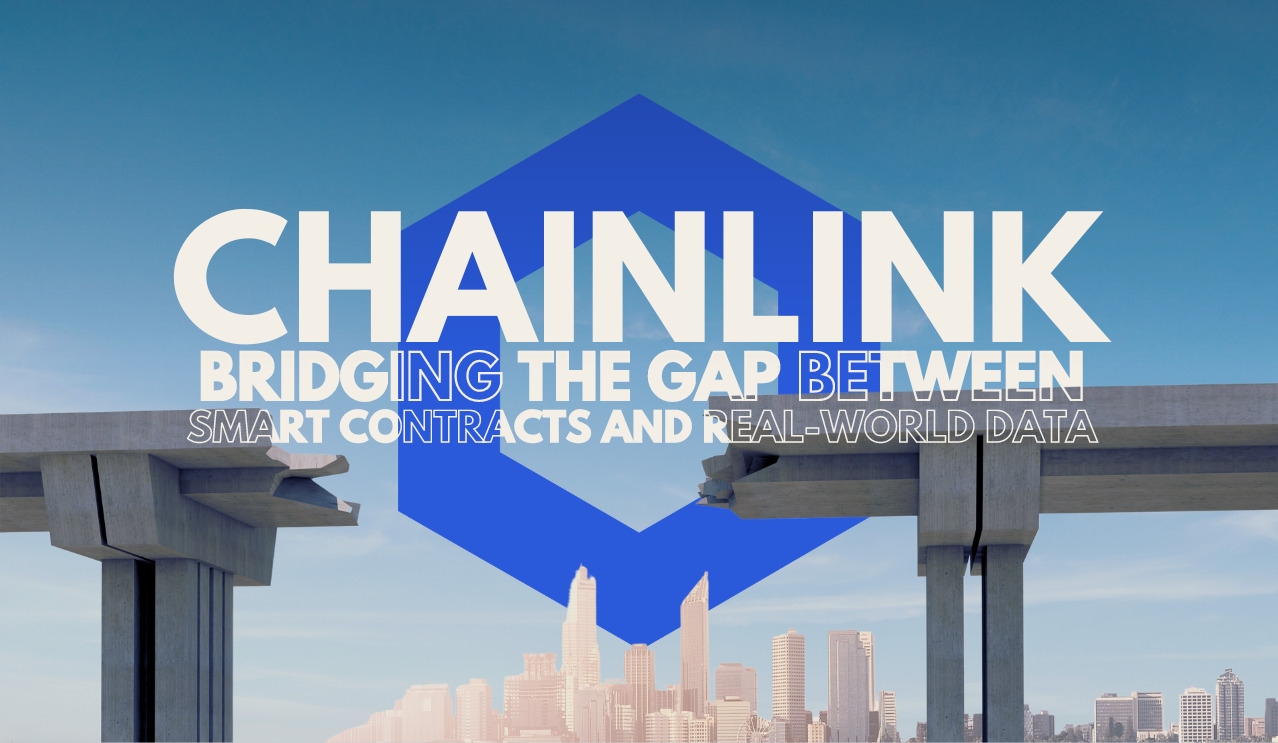
In the fast-paced realm of blockchain technology, smart contracts stand out as a groundbreaking tool, automating and safeguarding digital agreements without intermediaries. Yet, their full potential is constrained by a significant limitation: the inability to connect with real-world data. Chainlink: Enhancing Smart Contracts with Real-World Data plays a crucial role in this context. As a decentralized oracle network, Chainlink acts as a bridge, linking smart contracts to external data sources, thereby unlocking their full capabilities and broadening their applicability in the digital world.
Understanding Smart Contracts
Smart contracts are self-executing contracts with the terms directly written into code. They run on blockchain networks, ensuring transparency, security, and immutability. Smart contracts inherently operate in a closed environment, confined to the data available on the blockchain, and are disconnected from the external world. This design limitation becomes a substantial hurdle when the need arises to access and incorporate real-world data for the execution or completion of contractual terms and obligations.
Smart Contracts at a Glance:
- Definition: Smart contracts are self-executing contracts with the terms of the agreement directly written into code. They automatically execute actions when predefined conditions are met.
- Blockchain-Based: They operate on a blockchain, ensuring transparency, security, and decentralization.
- Immutable and Trustless: After deployment, smart contracts become immutable, creating a secure and trustless environment that enables parties to conduct transactions directly, without the necessity for intermediaries..
- Automated Execution: Smart contracts autonomously carry out actions such as asset transfers or token issuances once they meet the specified conditions.
- Use Cases: Various domains, including finance (DeFi), insurance, and supply chain management, actively utilize them.
- Benefits: Smart contracts offer advantages such as transparency, security, efficiency, and cost-effectiveness.
- Challenges: They face challenges including scalability, privacy concerns, and the need for external data sources for full functionality.
Chainlink: The Bridge to Real-World Data
Chainlink addresses the limitations of smart contracts by providing a decentralized network of oracles that act as intermediaries, fetching real-world data and bringing it onto the blockchain. This connection enables smart contracts to interact with external APIs, data feeds, and payment systems, expanding their applicability and functionality.
Chainlink Overview:
- Functionality: Chainlink connects smart contracts with real-world data, enabling them to interact with external APIs and data sources.
- Network: It operates on a decentralized network of oracles, which work together to provide reliable and secure data to smart contracts.
- Security: Chainlink ensures the integrity and reliability of the data provided to smart contracts, employing various mechanisms to verify and validate the data.
- Use Cases: It has a wide range of applications, including providing financial data for Decentralized Finance (DeFi) platforms, facilitating automatic insurance payouts, verifying supply chain information, and much more.
The integration of Chainlink with smart contracts marks a significant milestone in the blockchain space, unlocking the full potential of smart contracts. By enabling secure and reliable access to real-world data, Chainlink is paving the way for more innovative, transparent, and efficient digital agreements.
How Chainlink Enhances Smart Contracts
Chainlink plays a crucial role in enhancing the capabilities of smart contracts, providing them with secure and reliable access to real-world data. This section delves into the mechanisms and features that make Chainlink an indispensable tool for smart contract development and execution.
Secure Data Retrieval
One of the primary functions of Chainlink is to securely retrieve external data for smart contracts. It achieves this through a decentralized network of oracles, which are independent nodes responsible for fetching and validating real-world data. By decentralizing the process, Chainlink ensures that no single point of failure can compromise the integrity of the data.
| Step | Description |
|---|---|
| 1. Data Request | A smart contract sends a request for external data to Chainlink. |
| 2. Oracle Selection | Chainlink’s network selects a group of oracles to retrieve the data. |
| 3. Data Retrieval | Each oracle fetches the data from the real world and submits it back to Chainlink. |
| 4. Data Aggregation | Chainlink aggregates the data from all oracles, ensuring accuracy and reliability. |
| 5. Data Delivery | The aggregated data is delivered to the smart contract, triggering execution if necessary. |
Ensuring Data Integrity
Chainlink places a strong emphasis on ensuring the integrity and reliability of the data it provides to smart contracts. It employs various mechanisms to achieve this:
- Data Aggregation: Chainlink aggregates data from multiple oracles, mitigating the risk of inaccuracies or manipulation from any single source.
- Reputation System: Oracles in the Chainlink network are assigned reputation scores based on their performance and reliability. Smart contracts can specify a minimum reputation score for oracles, ensuring that only trustworthy nodes contribute to data requests.
- Cryptographic Proofs: Chainlink uses cryptographic proofs to verify the authenticity and integrity of the data from its source to the smart contract, ensuring that the data has not been tampered with during transmission.
Incentive Mechanisms
Chainlink employs a robust incentive mechanism to ensure that oracles in the network act honestly and reliably. Oracles are rewarded with LINK tokens, the native cryptocurrency of the Chainlink network, for providing accurate and timely data. Conversely, they are penalized and can lose their staked LINK tokens for any inaccuracies or misconduct.
| Action | Incentive |
|---|---|
| Providing Accurate Data | Oracles are rewarded with LINK tokens. |
| Providing Inaccurate Data | Oracles lose their staked LINK tokens. |
Chainlink significantly enhances the functionality of smart contracts by providing them with a secure and reliable means of accessing real-world data. Through its decentralized network of oracles, data aggregation mechanisms, reputation system, and incentive mechanisms, Chainlink ensures the integrity and reliability of the data, enabling smart contracts to interact with the external world in a trustless manner.
Addressing the Limitations of Smart Contracts with Chainlink
Smart contracts have revolutionized the way we approach digital agreements, but they are not without their limitations. This section explores the inherent challenges of smart contracts and how Chainlink plays a pivotal role in overcoming these obstacles, enhancing both their functionality and applicability.
The Isolation of Smart Contracts
One of the fundamental limitations of smart contracts is their isolation from the external world. They operate in a closed environment, meaning they can only access and process data available on the blockchain. This isolation ensures security and integrity but also limits their functionality, as many use cases require interaction with real-world data and events.
Chainlink as a Bridge to the External World
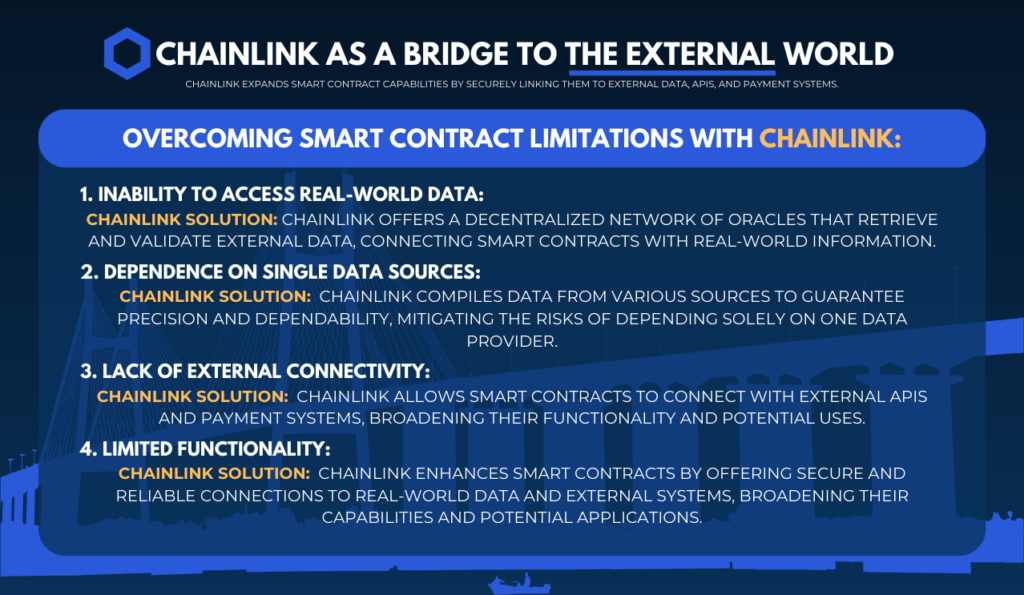
Chainlink addresses this limitation by acting as a bridge between smart contracts and the external world. It enables smart contracts to securely interact with external data sources, APIs, and payment systems, expanding their capabilities and potential use cases.
Overcoming Smart Contract Limitations with Chainlink:
- Inability to Access Real-World Data:
- Chainlink Solution: Provides a decentralized network of oracles to fetch and validate external data, bridging the gap between smart contracts and the real world.
- Dependence on Single Data Sources:
- Chainlink Solution: Aggregates data from multiple sources, ensuring accuracy and reliability, and reducing the risk associated with relying on a single data source.
- Lack of External Connectivity:
- Chainlink Solution: Enables smart contracts to interact with external APIs and payment systems, expanding their functionality and applicability.
- Limited Functionality:
- Chainlink Solution: By providing secure and reliable access to real-world data and external systems, Chainlink expands the capabilities and use cases of smart contracts.
This list format concisely presents how Chainlink addresses various limitations of smart contracts, enhancing their functionality and reliability.
Enhancing Functionality and Trust
By providing reliable access to external data, Chainlink enhances the functionality of smart contracts, allowing them to execute based on real-world events and information. This not only broadens the scope of what smart contracts can do but also increases their trustworthiness, as users can be confident that the data influencing smart contract execution is accurate and secure.
Real-World Examples
To illustrate how Chainlink addresses the limitations of smart contracts, let’s consider a few real-world examples:
- Decentralized Finance (DeFi): In DeFi applications, smart contracts rely on accurate price feeds of cryptocurrencies and other assets. Chainlink provides these smart contracts with secure and reliable access to price data, ensuring fair and transparent financial transactions.
- Insurance: Smart contracts in the insurance industry can use Chainlink to access real-world data such as weather conditions or flight statuses. This data can then be used to automatically process claims and payouts, streamlining the insurance process.
- Supply Chain Management: Chainlink enables smart contracts to interact with external data sources to verify the authenticity and condition of goods in a supply chain, enhancing transparency and accountability.
Chainlink plays a crucial role in addressing the inherent limitations of smart contracts, providing them with secure and reliable access to real-world data. By acting as a bridge to the external world, Chainlink enhances the functionality, applicability, and trustworthiness of smart contracts, paving the way for more innovative and efficient digital agreements.
The Technology Behind Chainlink: Ensuring Reliability and Security
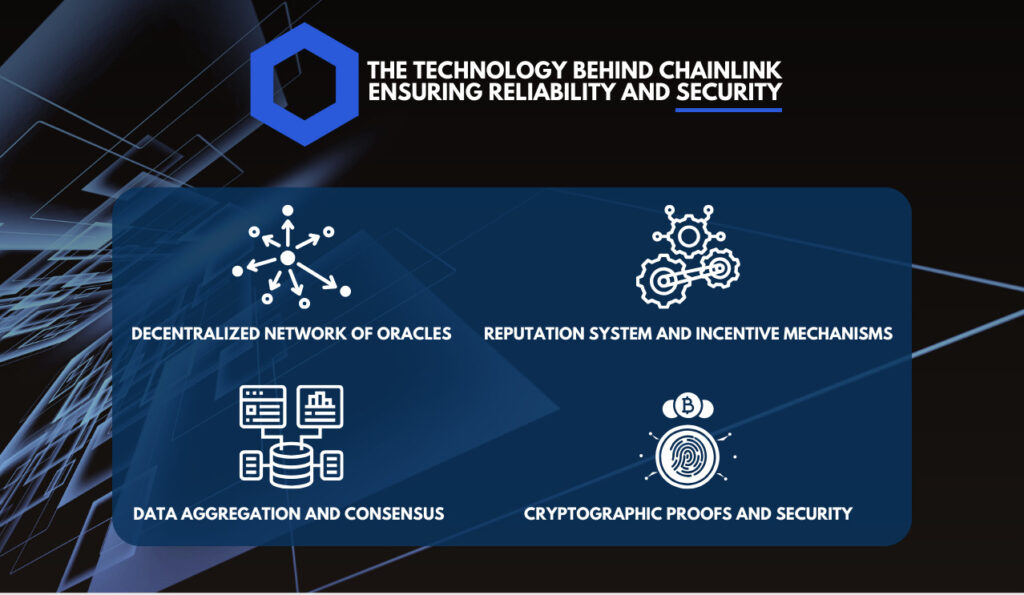
Chainlink stands out in the blockchain space not just for its ability to connect smart contracts with real-world data, but also for the robust technology and mechanisms it employs to ensure the reliability and security of this data. In this section, we delve into the technical aspects of Chainlink, exploring how it guarantees the integrity of the data provided to smart contracts.
Decentralized Network of Oracles
At the core of Chainlink’s functionality is its decentralized network of oracles. These oracles are independent nodes responsible for retrieving real-world data and delivering it to smart contracts. By decentralizing this process, Chainlink ensures that no single point of failure can compromise the integrity of the data.
Chainlink’s Decentralized Oracle Network:
- Oracles:
- Description: Independent nodes within the Chainlink network that have the responsibility of retrieving and validating real-world data. They play a crucial role in bridging the gap between smart contracts and external data sources.
- Decentralization:
- Description: Chainlink ensures the reliability and security of the data provided to smart contracts by distributing data retrieval and validation tasks across multiple oracles. This decentralization prevents any single point of failure and enhances the overall robustness of the network.
- Security:
- Description: Chainlink employs various mechanisms to verify the integrity and authenticity of the data retrieved by oracles. These security measures ensure that the data provided to smart contracts is accurate and reliable, fostering trust in the network.
Data Aggregation and Consensus
Chainlink employs a data aggregation process to compile and validate the data retrieved by different oracles. This process ensures that the final data provided to the smart contract is accurate and reliable, even if some oracles provide incorrect or manipulated data.
- Aggregation: Data from multiple oracles is compiled and processed to derive a consensus value.
- Outlier Detection: Any data points that deviate significantly from the consensus are flagged as outliers and excluded from the final value.
- Final Data Delivery: The aggregated and validated data is delivered to the smart contract, ensuring its accuracy and reliability.
Reputation System and Incentive Mechanisms
Chainlink incorporates a reputation system and incentive mechanisms to ensure that oracles in the network act honestly and reliably.
- Reputation System: Oracles are assigned reputation scores based on their past performance and reliability. Smart contracts can specify minimum reputation scores for oracles, ensuring that only trustworthy nodes contribute to data requests.
- Incentive Mechanisms: Oracles are rewarded with LINK tokens for providing accurate and timely data, while those providing incorrect data are penalized. This system incentivizes honest behavior and ensures the overall reliability of the network.
Cryptographic Proofs and Security
Chainlink employs cryptographic proofs to verify the authenticity and integrity of the data from its source to the smart contract. These proofs ensure that the data has not been tampered with during transmission, providing an additional layer of security.
The technology behind Chainlink is what sets it apart in the blockchain space, ensuring the reliability and security of the data provided to smart contracts. Through its decentralized network of oracles, data aggregation and consensus mechanisms, reputation system, incentive mechanisms, and cryptographic proofs, Chainlink guarantees the integrity of the data, enabling smart contracts to interact with the external world in a trustless manner.
Benefits and Challenges of Using Chainlink
Chainlink has undeniably transformed the landscape of smart contracts, enhancing their capabilities and applicability. However, like any technology, it comes with its own set of benefits and challenges. In this section, we will explore the advantages of integrating Chainlink with smart contracts, as well as the potential hurdles and considerations that developers and users might face.
Benefits of Using Chainlink
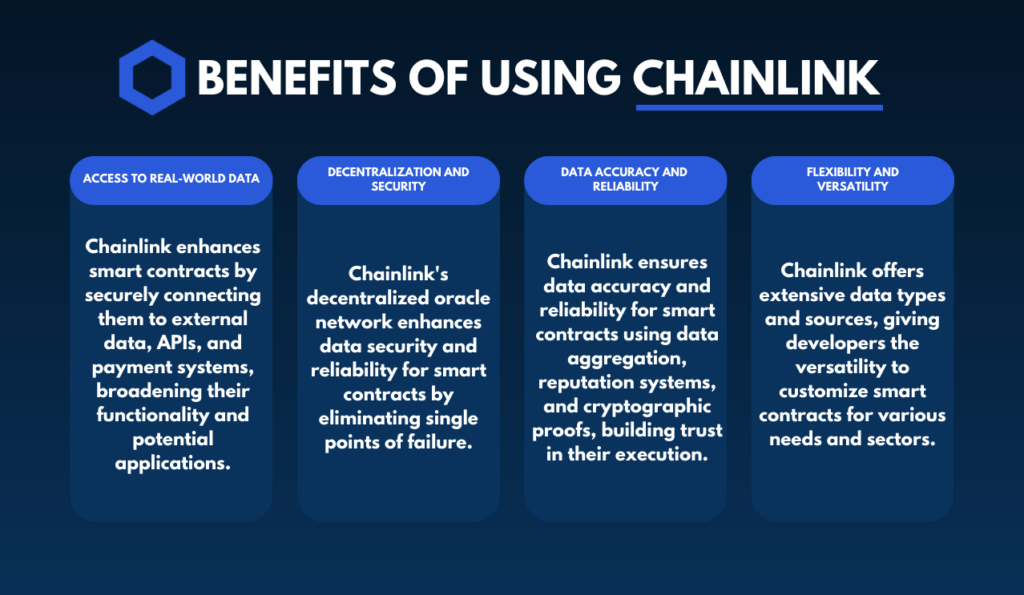
- Access to Real-World Data: Chainlink enables smart contracts to securely interact with external data sources, APIs, and payment systems, significantly expanding their functionality and potential use cases.
- Decentralization and Security: The decentralized nature of Chainlink’s oracle network ensures that no single point of failure can compromise the integrity of the data provided to smart contracts, enhancing security and reliability.
- Data Accuracy and Reliability: Through mechanisms such as data aggregation, reputation systems, and cryptographic proofs, Chainlink guarantees the accuracy and reliability of the data, fostering trust in smart contract execution.
- Flexibility and Versatility: Chainlink supports a wide range of data types and sources, providing developers with the flexibility to tailor smart contracts to specific needs and industries.
Challenges and Considerations
- Complexity of Implementation: Integrating Chainlink with smart contracts can be complex, requiring a deep understanding of both blockchain technology and Chainlink’s protocols.
- Transaction Costs: Utilizing Chainlink’s oracle network incurs transaction costs, which can vary based on network congestion, data complexity, and other factors. Developers and users need to be mindful of these costs when designing and using smart contracts.
- Dependence on LINK Token: Chainlink’s incentive mechanisms rely on the LINK token, creating a dependence that could pose challenges, particularly in terms of token volatility and liquidity.
- Need for Continuous Innovation: The blockchain space is rapidly evolving, and Chainlink must continuously innovate to stay ahead of technological advancements and changing user needs.
Real-World Applications of Chainlink
Chainlink’s ability to securely and reliably connect smart contracts with real-world data has paved the way for a multitude of innovative applications across various industries. In this section, we will explore some of the most prominent real-world use cases of Chainlink, highlighting how it is transforming industries and enhancing the functionality of smart contracts.
Decentralized Finance (DeFi)
One of the most significant applications of Chainlink is in the Decentralized Finance (DeFi) sector. DeFi platforms leverage smart contracts to offer financial services such as lending, borrowing, and trading without the need for traditional intermediaries.
- Price Oracles: Chainlink provides DeFi platforms with accurate and reliable price feeds for various cryptocurrencies and assets, which are crucial for functions like collateralization ratios, liquidations, and determining the value of assets in a trading pair.
- Random Number Generation: DeFi platforms leverage Chainlink’s VRF (Verifiable Random Function) service to produce secure and verifiable random numbers, essential for applications such as lotteries and gaming.
Insurance
Chainlink is also making waves in the insurance industry, particularly in parametric insurance, where payouts are triggered by predefined events.
- Flight Insurance: Smart contracts can use Chainlink to access flight status data, automatically processing claims and payouts in case of delays or cancellations.
- Crop Insurance: Farmers can leverage smart contracts connected to Chainlink to receive automatic payouts based on weather data, such as rainfall or temperature.
Supply Chain Management
Chainlink enhances transparency and accountability in supply chain management by connecting smart contracts with real-world data.
- Product Authenticity: Smart contracts can verify the authenticity of products by accessing data related to manufacturing, shipping, and handling.
- Inventory Management: Chainlink enables smart contracts to interact with inventory systems, automating processes like restocking and order fulfillment.
Gaming and NFTs
Chainlink enhances user experience and adds extra functionalities in the gaming industry and Non-Fungible Tokens (NFTs) market.
- Random Number Generation for Games: Chainlink’s VRF service ensures fair and unpredictable random number generation in games, directly influencing in-game events and outcomes.
- Dynamic NFTs: Chainlink enables the creation of NFTs that can change based on external data, such as sports scores or market conditions.
Chainlink’s ability to bridge the gap between smart contracts and real-world data has led to its adoption across a wide range of industries, from finance and insurance to supply chain management and gaming. By enhancing the functionality, transparency, and efficiency of smart contracts, Chainlink is playing a pivotal role in the realization of blockchain’s full potential.
The Future of Chainlink and Smart Contracts
As we look ahead, the integration of Chainlink with smart contracts is poised to continue playing a transformative role in the blockchain ecosystem. This section explores the potential developments, challenges, and opportunities that lie in the future for Chainlink and smart contracts.
Continued Expansion and Integration
Chainlink is expected to expand its network of data providers and services, further enhancing the capabilities of smart contracts. This expansion will likely lead to an increase in the adoption of Chainlink across various industries, as more organizations recognize the benefits of secure and reliable real-world data integration.
Future Expansion of Chainlink
Chainlink is rapidly growing and innovating, expanding its range of data providers and services to offer more capabilities to smart contract developers and users. Its technology is gaining traction across various industries as more organizations see the value in securely linking real-world data with smart contracts. This increasing adoption and continuous improvement of services are vital for Chainlink’s ongoing expansion and solidification of its critical role in the blockchain ecosystem.
Advancements in Scalability and Efficiency
As the adoption of Chainlink grows, there will be a need for improvements in scalability and efficiency. Future developments may focus on optimizing data retrieval and transmission processes, as well as enhancing the overall performance of the Chainlink network.
Scalability and Efficiency Improvements
To meet rising demand and maintain efficiency, the Chainlink network is undergoing significant enhancements in data retrieval and transmission processes, improving speed, accuracy, and capacity. These upgrades ensure robust performance and scalability, reinforcing Chainlink’s status as a top decentralized oracle network for the diverse and growing needs of the blockchain ecosystem.
Strengthening Security Protocols
The security of the data provided to smart contracts is paramount, and Chainlink is likely to continue investing in advanced security protocols. This could involve the implementation of more robust cryptographic techniques, as well as the introduction of additional mechanisms to ensure the integrity and authenticity of the data.
Security Enhancements in Chainlink Network:
- Cryptographic Techniques:
- Description: Chainlink is implementing advanced cryptographic techniques to enhance the security of data transmission and validation, ensuring that the data provided to smart contracts is secure and tamper-proof.
- Data Integrity:
- Description: Chainlink is implementing extra measures to maintain the integrity and authenticity of the data its oracles retrieve. These measures include various checks and validations to confirm that the data remains unaltered and uncompromised.
- Security Protocols:
- Description: The Chainlink network is currently fortifying its security protocols, ensuring a robust and trustworthy environment that facilitates secure interactions between smart contracts and real-world data.
Navigating Challenges and Embracing Opportunities
As Chainlink navigates the future, it will face challenges such as the complexity of integration, managing transaction costs, and ensuring the continuous innovation required to stay ahead in the rapidly evolving blockchain space. However, the opportunities presented by Chainlink’s technology, particularly in enhancing the functionality and applicability of smart contracts, are vast and hold the potential to drive further innovation and adoption.
Chainlink and smart contracts hold a promising future, brimming with potential and opportunities. Chainlink actively pursues developments to broaden its data source spectrum, boost scalability, fortify security, and tackle current challenges. This proactive stance places Chainlink in a prime position to keep molding the future of smart contracts and the extensive blockchain ecosystem.
Conclusion
Chainlink revolutionizes the blockchain ecosystem, securely connecting smart contracts with real-world data through a decentralized oracle network. It enhances smart contract versatility across industries, ensuring data integrity and reliability. Chainlink is expanding its data sources, improving scalability, and strengthening security, positioning itself as a key player in blockchain’s evolution. Despite challenges like complexity and transaction costs, Chainlink’s contributions are invaluable for the future of connected, transparent, and decentralized digital interactions.
